How legendary sports commentator Bruce McAvaney pulled off the broadcasting impossible during the pandemic
When the pandemic began legendary broadcaster Bruce McAvaney wasn’t sure he’d call a live game of footy all year. Fast-forward to October and not only is he calling the AFL’s first night grand final, but the 100th Cox Plate next week.
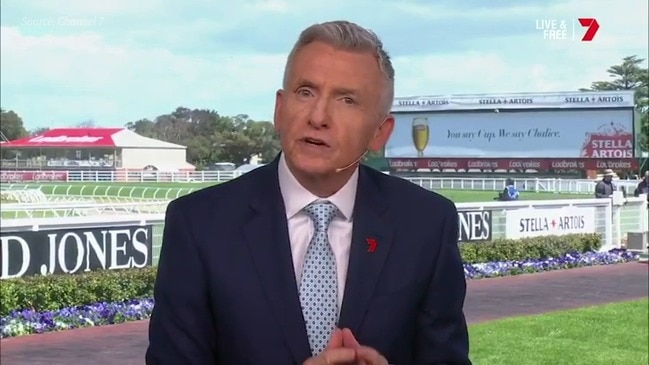
Lifestyle
Don't miss out on the headlines from Lifestyle. Followed categories will be added to My News.
It was the three-day road trip that kicked off the most challenging year of Bruce McAvaney’s four-and-a-half decades of sports broadcasting.
He and his wife, Annie, were working in Sydney at the time when the COVID-19 pandemic cast an ominous shadow across Australia, and indeed the world.
It was April 6, 2020.
State borders that had always been opened were suddenly in danger of being shut.
The number of coronavirus cases and deaths in Australia was rising alarmingly.
Just over two weeks earlier, McAvaney had sat alongside Brian Taylor at the MCG, calling the AFL season opener between Richmond and Carlton — sans crowds — with the eerie atmosphere unlike anything the veteran caller had ever experienced.
Three days later, the AFL had to postpone its season, and McAvaney feared he might have called his last match for the year.
“There was such a doom and gloom around Round 1,” McAvaney, 67, tells Weekend in an exclusive interview.
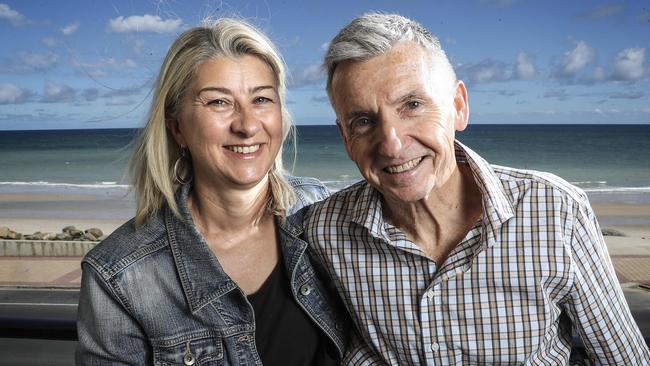
“(On the Sunday) there was the announcement (the season had been postponed), with another game still to be played in Perth, which seemed almost meaningless.
“We thought ‘Will we ever get started again?’ At that stage, it looked very doubtful.”
With so much uncertainty engulfing the country, McAvaney and his wife decided it was time to return to South Australia.
They embarked on a 1377km journey — complete with their cavador dog, Frankie — bound for a quarantine stint in a little shack they own on the Fleurieu Peninsula.
“We spent two weeks in quarantine there,” McAvaney says. “We did two racing broadcasts (including the final day of Sydney’s The Championships) from that little shack.
“Those broadcasts gave the network the confidence that maybe doing things remotely might actually work.”
McAvaney had a semblance of hope he could stay involved remotely if, and when, the footy returned.
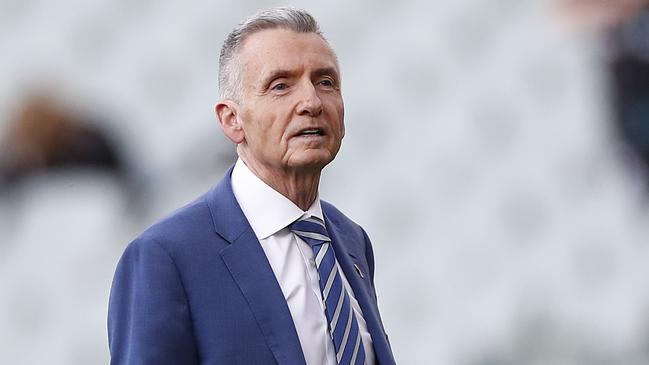
Ever the professional, McAvaney insisted if he couldn’t keep his on-air rapport with Taylor and the Channel 7 team from a network studio in Adelaide, he wouldn’t do it.
So when the AFL announced its season would recommence on June 11, it was a make-or break moment.
A bizarre test run was conducted on the night before Collingwood and Richmond Round 2 resumption.
Taylor was still permitted inside the MCG back then, and he and McAvaney called a half of football from the Magpies-Tigers VFL practice match — from different states.
“It went right to the wire,” McAvaney says. “(If that night hadn’t gone well), we were in trouble.
“I went in there not knowing if I had the chance to call this year or not.
“BT went to the MCG; I was at Channel 7 in Adelaide. We did the first half of the reserves game between Collingwood and Richmond. To be truthful, we didn’t know half the players. Some of them weren’t even on club lists.
“The whole thing was to see whether I could communicate well enough with Brian (to call). Could we have that sort of comradeship we needed to do a telecast?”
McAvaney had several monitors assisting him, featuring the match, the rooms, the broadcast studio Taylor was calling from, and the on-ground special comments people.
For a time, the chemistry seemed touch and go. But the call — which was never aired publicly — clicked at precisely the right time.
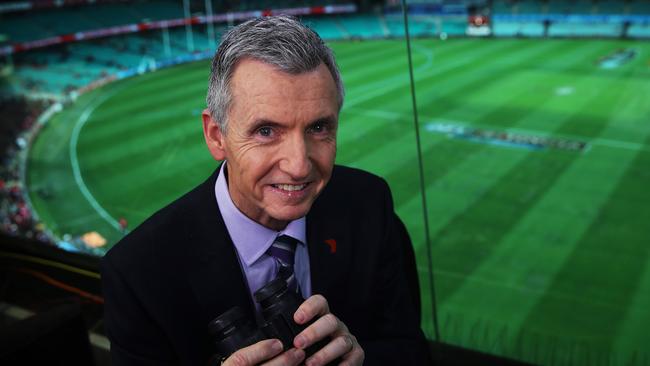
“I walked away from the studio thinking, ‘We can do this’ and Brian said ‘Yep, we can do this’,” he says. “We went back the next night and we did it (for the AFL game).”
That’s how it worked for the first month of the resumption — Taylor at the ground in Melbourne; McAvaney in an Adelaide studio.
Then Melbourne’s second wave of coronavirus changed the parameters once again.
As such, McAvaney hasn’t seen his son, Sam, who works for Channel 7 in Melbourne, since March.
“We miss him terribly,” McAvaney says. His daughter, Alex, lives in Adelaide.
With the AFL games and clubs moving north, and with Melbourne in lockdown, the realisation of how important the game was for those struggling for any distraction was not lost on him.
“The broadcasters have been more important than ever this year because no one (in Victoria) has been able to get to the grounds,” he says.
“Their only hope of seeing it and being a part of it has been either through us, or Fox, or the radio stations, or the newspapers. The media has played a massive role in this season, an even more important role than they normally would do.”
He says the AFL, the clubs, coaches, players, broadcasters and the fans have much to be proud of to have almost made it through a season that for a time looked like it wouldn’t be completed.
“It shows how much this game means to so many people,” McAvaney says. “I am not sure the players would have made the sacrifices they have made if it didn’t mean as much to them.
“The players have responded in the most magnificent fashion.
“It is an indication of what the competition and what the sport means to so many millions of people in Australia, and how important it is to the nation.”
McAvaney and Taylor have called together — from different states — this year but in many ways they have never been closer.
“We have probably had more chats away from the contest than normally this year,” he says. “Trust is everything.
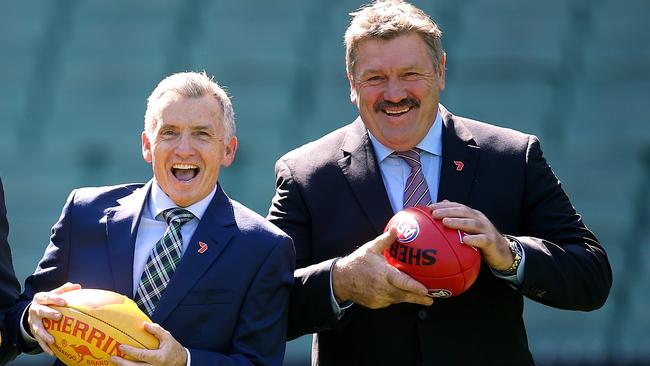
“It is not BT calling, or me calling. It is the combination. It is a beautiful thing and I feel very privileged to be a part of that.
“Brian is a brilliant commentator. He is his own man and when the heat is on, he just flies with it and is quite outstanding.”
Asked about the biggest difference between Taylor and his former long-time colleague Dennis Cometti, he says: “Dennis was a softer touch than BT.”
“Denis would make you laugh with a feather, but BT probably tickles you a bit harder under the arms.”
Remote calling has thrown up its challenges.
He laments using Taylor’s name too often this year, but it was to ensure the call flows as seamlessly as possible.
Calling off a monitor makes it hard to get a complete visual of the ground and calling goals off a monitor can be a bit more problematic than live.
But McAvaney has adapted on the run, and it has made him feel as sharp as he has been for some time.
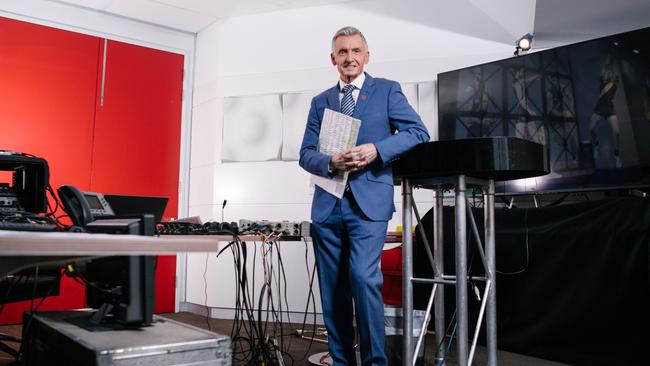
Fast forward almost 200 days since that long early April road trip, at the time of writing McAvaney was finally due to be in the same broadcast studio as Taylor at the Adelaide Oval for last night’s Port Adelaide-Richmond preliminary final.
It was the first time that has happened since March.
Then the pair — and the rest of the commentary team — are due to fly to Brisbane for tonight’s Lions-Cats preliminary final at the Gabba, where a specially-built small studio will allow McAvaney to be a part of the network’s racing coverage of the Caulfield Cup and the Everest.
He’s excited — and grateful — to be back calling at venues.
He had been to two previous Adelaide Oval games this year — the Western Bulldogs Hawthorn game in Round 17 and the Port Adelaide-Geelong qualifying final.
Each of those games he called off the monitor instead of live through the window, so he could maintain that connection with Taylor on the monitor.
“This week is the first time I can stand up and look at the ground and call as normal, because BT is going to be beside me, and so is Luke Hodge and Jude Bolton, and we will be able to go down to the boundary with Abbey Holmes and Mark Soderstrom.
“This week it is the first time it is going to feel like 2019 all year.”
McAvaney is only seven days out from calling the historic 2020 night Grand Final at the Gabba.
It is a daunting task made more complex by the fact he will do an hour cross to Moonee Valley for the 100th running of the Cox Plate a few hours before the footy.
“I’ll probably never experience anything like it again,” he says. “It is daunting, but at the same time, it is very exciting.”
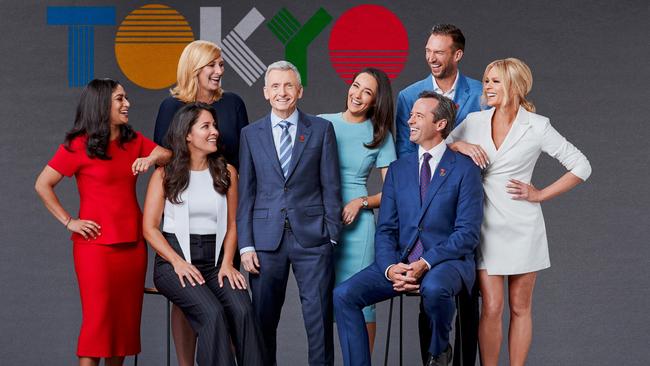
The pandemic cost McAvaney a missed trip to Tokyo this year.
But he has become increasingly confident the rescheduled Olympic Games will take place next July and August and he aims to be there.
He says the International Olympic Committee had no choice but to postpone the 2020 Games earlier this year.
“It was the most logical decision they could make,” the man sometimes known as “Mr Olympics” explains.
“Looking ahead to next year, I am more optimistic now than I was three months ago in thinking there really is a big strong chance it will go ahead.
“If it does happen — and that’s no certainty — there will be less crowds, a lot of remote commentary and it could be a television event as much as a live event.
“But if it does happen, it will be the most emotional Games of all-time because of what people have gone through.”
McAvaney has been an Olympics staple on our screens for so long now, with his famous call of Cathy Freeman’s 400m gold medal performance at the Sydney Games being replayed over and over again last month on the 20th anniversary of the race.
He plans to keep that Olympic tradition alive next year.
“I hope to be on the ground (in Tokyo) calling the track and field from the stadium,” he says. “That’s my wish, but if I am not, I will be absolutely as committed and enthusiastic if I am calling from back here.”
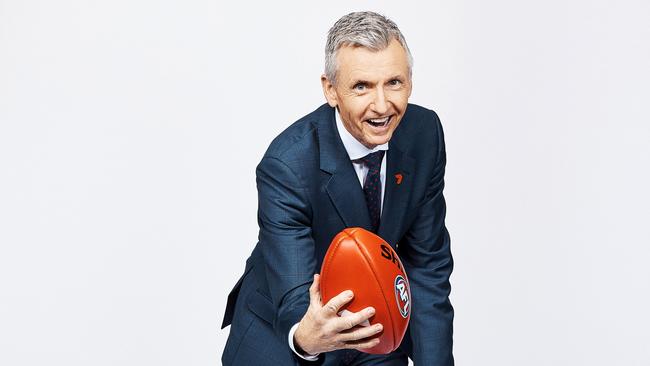
A phone call at the end of every year with Seven Melbourne managing director Lewis Martin ratifies McAvaney’s plans for the following year.
It’s the television equivalent of a handshake agreement based on respect and trust.
“Lewy rings me and says ‘Macca, what do you reckon?’ I say to him ‘Lewy, what do you reckon?’, and we go from there,” he says. “He has been wonderful for me.
“It is a fluid arrangement surrounded by trust and a relationship that has been there for a long time. “I can categorically say that I am not going to be working for anyone else.
My broadcasting career will be finishing at Seven and that’s the way it should be.”
Importantly, lessons learnt in the pandemic might have paved the way to extend McAvaney’s calling longevity.
“When you get towards 70, and that’s what I am getting towards now, you do get to a moment where you have to say ‘OK, how much longer can the network want me and how much longer would I want to do this?” he says.
“I think it (calling remotely) may have opened the door to give me a longer life as a broadcaster.
“You would never call a Grand Final remotely, or an Anzac Day game, or a blockbuster Friday night game. But there may be an opportunity where I don’t have to get on a plane every week of the year.”
McAvaney would usually board a plane from Adelaide each Thursday or Friday morning on 35 to 40 weeks of a normal year.
The enthusiasm that has defined him — and his broadcasting — since he relinquished a role as a Telecom clerk in 1976 to launch his career in the sports media is never far from the surface.
He had a health scare when diagnosed with chronic lymphocytic leukaemia in 2017, but he says he is feeling as energetic as ever.
“I am of the view that we are all improving,” he said. “That drives me on.
“I have learnt that I am far from perfect. I have some nights when I call better than others and when you don’t have as good a night, you learn from that.
“You also have to have a laugh and say ‘We are not surgeons, it’s not life and death’.”
MORE NEWS:
IT'S THE END OF THE OLYMPICS AS WE KNOW IT
I’M TO BLAME FOR MCGUIRE’S SUCCESS: MCAVANEY
